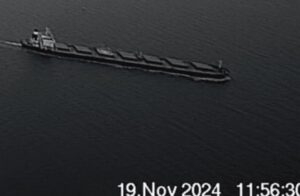A new thriller is unfolding in the Baltic, which began on Sunday when it was discovered that undersea telecommunication cables connecting Finland to Germany and Sweden to Lithuania had been damaged. This incident echoes the Nord Stream pipeline case that captured global attention about two years ago.
German Defense Minister Boris Pistorius openly referred to “possible sabotage,” emphasizing that the damage to the cables “could not have occurred accidentally.” His statement gained further weight when it was revealed that a Chinese ship, which had departed from a Russian port over the weekend, was present at the locations where the damage occurred. The ship is reportedly captained by a Russian national.
The ship in question, the cargo vessel Yi Peng, was detained yesterday by the Danish Navy. Late Tuesday night, maritime trackers indicated that the 2001-built vessel was anchored in the Kattegat Strait—between Denmark and Sweden—while at least one Danish naval ship was nearby.
The Yi Peng, managed by the Chinese shipping company Ningbo Yipeng, had departed from the Russian port of Ust-Luga in the Leningrad region and was en route to Port Said, Egypt, carrying pig iron.
According to Swedish state television SVT and Finnish national broadcaster Yle, which analyzed available data, the ship approached the sites of the cable damage at the times when internet disruptions were reported in the two countries. However, Finnish authorities remain cautious about assigning blame as the investigation is still in its early stages.
“The location where the undersea cable connecting Helsinki to Germany is damaged is a busy area at all times of the day,” said Joona Castrén, head of the Gulf of Finland Coast Guard Command. “Many cargo and passenger ships pass through the region,” he added.
Not the First Incident
Last October, a natural gas pipeline between Finland and Estonia was damaged when a Chinese container ship accidentally struck the pipeline with an anchor. However, this time, Berlin ruled out the possibility of an “accident” from the outset.
“We must conclude, without knowing exactly who did it, that this is a hybrid operation. We must also assume—without proof—that this is sabotage,” Pistorius stated.
Suspicious Attacks on Internet Cables
The first incident occurred on Sunday at around 8 a.m. local time on a 135-mile (218-kilometer) internet connection between Lithuania and the Swedish island of Gotland, according to telecommunications company Telia Lietuva, causing service disruptions.
The second was on a 1,200-kilometer (746-mile) cable connecting Helsinki to the German port of Rostock, which stopped functioning around 2 a.m. local time on Monday, according to Finnish cybersecurity and telecommunications company Cinia.
Russia’s Response
Addressing suspicions that Russia might be behind the Baltic cable damage, Kremlin spokesman Dmitry Peskov commented on Wednesday morning, calling the allegations “ridiculous.”
“It is absurd to keep blaming Russia for everything without any justification,” Peskov told reporters, adding that Ukraine is more inclined to engage in sabotage and terrorism in the Baltic seabed.
“This is rather ludicrous, especially when there is no response to Ukraine’s subversive activities in the Baltic Sea. You know Ukraine is the one that actually prefers engaging in sabotage and terrorism on the Baltic seabed. I’m referring to the Nord Stream explosions,” Peskov said.
Ask me anything
Explore related questions





